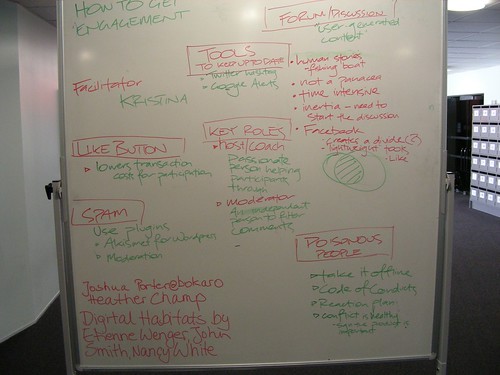Today the Engage Your Community unConference, initiated by Wellington ICT, took place at the Rutherford House at Victoria University in Wellington. It was “a day long learning event for community webmasters and others using IT for Wellington’s communities”. On top of that, it was free thanks to its sponsors.
Around 90 people fought the urge to stay outside in the wonderful sunshine and rather warm temperatures to engage with like-minded people in discussions around using the web with communities. Some people had already thought about a topic to present beforehand while others decided on the spot.
I belonged to the latter category. After listening to a number of people shouting out their topics in the opening session, I thought I did not want to bring yet another tool-centered session to the table. Therefore, I decided to offer a session on online community engagement after all the tools had been set up and talk about what happens then, how to get people to participate, and how to keep them interested in the conversation.
Engaging communities online
As I do not have eternal wisdom in that area, but wanted to share my experience as well as tips I had learned at WordCampNZ just a couple of weeks ago, in particular from Suzanne Kendrick on Day 1 and Matt Miller on Day 2 (using his example of story telling to not talk about your business but just something interesting), I started the session also hoping that others would want to share their thoughts.
The group of about 18 participants took to the topic and brought in their own perspectives and community management tips that worked for them. Tim McNamara volunteered to jot down notes. It became clear that people in one community do not all communicate in one space, but that community organizers who want to reach their community, should be present in a number of spaces online and offline to cater to the community. Discussions on Facebook may differ greatly from those in a discussion forum on the community site itself. Sometimes just having a “like” button next to a post already helps to engage those (the majority) who would otherwise not comment.
A great book to read on the topic of online community stewardship is Digital Habitats: Stewarding Technology for Communities by Etienne Wenger, Nancy White and John Smith.

Are you interested in learning more how the day progressed? Continue with part 2 and then part 3.
![]() This work is licensed under a Creative Commons Attribution-ShareAlike 4.0 International License.
This work is licensed under a Creative Commons Attribution-ShareAlike 4.0 International License.